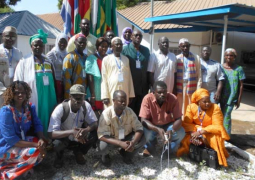One hundred years on since the first International Women’s Day, despite some progress there is still much to be done to achieve gender parity; achieving gender parity remains a major challenge.
Women’s decision-making ability and participation are closely linked with women’s overall advancement and empowerment. Over a decade ago the United Nations Fourth World Conference on Women called for increasing women’s capacity to participate in decision-making. Yet for many rural women today, particularly in developing countries, the ever-present realities continue to impact meaningful progress.
Today, March 8, 2012 is yet another International Women’s Day. International Women’s Day is a time for taking stock of the overall status of women around the world. It is a time for celebration, reflection and a time to keep Hope alive.
International Women’s Day recognizes and celebrates the economic, political and social achievements of women; draw on lessons learnt and more, especially remain encouraged of what lies ahead. This year, the United Nations overall International Women’s Day theme is: “Empower Rural Women - End Hunger and Poverty”.
In every country, government and women organizations adopt the international theme to reflect national priorities and therefore the West Africa Network for Peace-building - WANEP Gambia - is excited to be identified with the global and national celebrations of International Women’s Day under the theme: ‘Women in Decision-Making’.
In line with the theme for the celebration this year, WANEP Gambia and partners, under its Gender and Democracy project of the United Nations Democracy Fund Project (UNDEF) – ‘Gender in Democracy’, advocate for increase representation and participation of women in decision-making.
International and national instruments, such as the CEDAW and the Millennium Development Goal (MDGs) No. 3, promote gender equality and empower women. UNSCR 1325, the 1997 Constitution and 2010 Women Act provide the legal framework for the participation of women in decision-making.
In the realm of decision-making, International Women’s Day this year is of particular significance to the women of The Gambia in light of the upcoming National Assembly and local government Elections. The elections present a window of opportunity for active and quality participation of women in the electoral processes at both national and local levels of governance.
WANEP Gambia, in keeping with its theme for International Women’s Day this year, will be organizing a one-day regional Stakeholder Forum on the provisions of United Nations Security Council Resolution 1325 – Women Peace and Security.
The objective of the forum is to create awareness of the Resolution among regional stakeholders.
UNSCR 1325 underscores women’s rights to political empowerment and to influence public decision-making. The Resolution calls for increased representation and participation in governance, peace-keeping effort at both national and international levels.
Since its adoption over 10 years ago, there has been a significant increase in the number of women in political positions in many African countries including The Gambia.
In moving the UNSCR 1325 agenda forward, selected African countries including The Gambia have either established National Action Plans or are in the process of making it happen.
WANEP Gambia and partners are committed to the empowerment of women for sustainable development and peace building in The Gambia.
Women’s representation and participation in decision-making processes is crucial to the overall advancement of women. It is about opportunities and choices.
As together we mark another year of International Women’s Day, WANEP Gambia invites all to celebrate and reflect on the importance and the need for more women to become part of the decision-making processes.
Reflection:
If you want something said, ask a man; if you want something done, ask a woman.’ Margaret Thatcher


